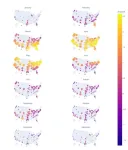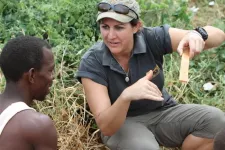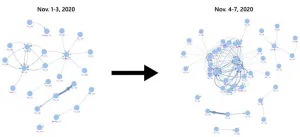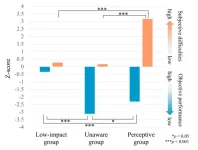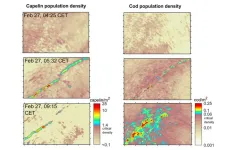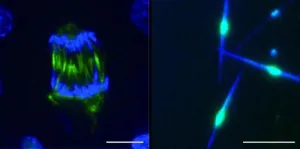(Press-News.org) Complaining about your allergies online might provide valuable data to researchers. Over 25% of Americans experience seasonal allergies, but how the prevalence of seasonal allergies varies across space and time remains obscure, in part because allergies seldom warrant visits to healthcare providers. Elias Stallard-Olivera and Noah Fierer mined Twitter (now X) posts and Google searches from 2016–2020 to extrapolate spatial and temporal allergy patterns. A natural language processing model sorted posts that indicated symptoms (e.g., “My allergies are really bad today!!”) from posts that include key words but did not indicate the presence of symptoms (e.g., “Gluten and Allergy Free expo”). The authors validated their data against emergency department (ED) visits for manifestations of seasonal allergies. The duo found reasonably strong relationships between online activity about seasonal allergies and ED records. The authors then used the resulting model to infer seasonal allergy patterns across all major metropolitan areas in the United States. The resulting maps show a strong national pulse of allergy symptoms in March–May: a wave of low-grade human misery beginning in the Southeast and ending in the Northeast and Upper Midwest. Interannual variability is considerable. According to authors, anomalous spikes of allergy symptoms, such as a one recorded in Los Angeles County in June 2018, could indicate booms in specific pollens or molds. According to the authors, the method could assist with predictive modeling of seasonal allergies and allergen exposures.
END
Internet activity reveals national allergy patterns
2024-10-29
ELSE PRESS RELEASES FROM THIS DATE:
New study confirms beehive fences as highly effective in reducing human-elephant conflict, but researchers warn of future risks
2024-10-29
[11:00 GMT - 29 Oct 2024] A groundbreaking, nine-year study has revealed that elephants approaching small-scale farms in Kenya avoid beehive fences housing live honey bees up to 86% of the time during peak crop seasons, helping to reduce human-elephant conflict for local farmers and boost income. Link to images and video of the project available
Key findings include:
Beehive fences are a proven success in reducing human-elephant conflict in Africa.
Savannah elephants avoid beehive fences housing live honey bees up to 86% of the time during peak crop seasons.
Across all seasons and the entire study period, the fences deterred an annual average of 76% of 3,999 ...
Tiny gold radiators fry bacteria on implants
2024-10-29
In the fight against antibiotic resistance, a new technology developed at Chalmers University of Technology, in Sweden, can be of great importance when, for example, hip and knee implants are surgically inserted. By heating up small nanorods of gold with near-infrared light (NIR), the bacteria are killed, and the surface of the implant becomes sterile. The researchers are now presenting a new study that increases the understanding of how the gold rods are affected by light and how the temperature in them can be measured.
Infections can occur during surgical procedures, with the risk increasing significantly when foreign materials, ...
WISH announces shortlist for Global Healthcare Innovation Awards
2024-10-29
29 October 2024. Doha, Qatar – The World Innovation Summit for Health (WISH), an initiative of Qatar Foundation, has shortlisted 12 innovators for two awards within the 2024 WISH Global Healthcare Innovation Competition. Selected from more than 150 applications, the 12 will showcase their groundbreaking innovations to global policymakers and healthcare leaders at this year’s summit in Doha, 13-14 November.
In addition to the chance to receive one of two investment awards of US$10,000, shortlisted innovators will have access to mentoring sessions with industry experts to learn ...
Discovery of cancer risk associations for six novel genes
2024-10-29
Discovery of cancer risk associations for six novel genes
Scientists at deCODE genetics/Amgen, and their collaborators have discovered six novel genes with rare germline variants that associate with cancer risk. The findings are published today in Nature Genetics under the title “Gene-based burden tests of rare germline variants identify six cancer susceptibility genes”.
A subset of cancers arises in individuals who are born with rare sequence variants that significantly alter their cancer risk. The discovery of such variants, like those in the BRCA1- and BRCA2 genes, has led to improved early cancer detection ...
More than half of European heat-related deaths in summer 2022 attributed to anthropogenic warming
2024-10-29
The unprecedented temperatures in the summer of 2022 caused more than 68,000 deaths on the continent, according to a study by the Barcelona Institute for Global Health (ISGlobal), a centre supported by the 'la Caixa' Foundation. A new study has now found that more than half - 56% - of the heat-related deaths in the summer of 2022 were related to human-induced climate change. According to the research, 38,154 of the 68,593 heat-related deaths in the summer of 2022 would not have occurred without anthropogenic warming.
The ...
Major events like presidential elections bring online hate communities together
2024-10-29
WASHINGTON (October 29, 2024) – A new study published today details the ways in which the 2020 U.S. election not only incited new hate content in online communities but also how it brought those communities closer together around online hate speech. The research has wider implications for better understanding how the online hate universe multiplies and hardens around local and national events such as elections, and how smaller, less regulated platforms like Telegram play a key role in that universe by creating and sustaining hate content.
The study – published in the journal npj Complexity, part of the Nature portfolio of journals – ...
Classification of schizophrenia into clinical subtypes based on objective and subjective social cognition
2024-10-29
A research team led by Professor Takahiro Nemoto at Toho University, in collaboration with Associate Professor Naoki Hashimoto and Assistant Professor Ryo Okubo at Hokkaido University, and Dr. Satoru Ikezawa at the National Center of Neurology and Psychiatry explored the agreement or discrepancy between subjective social cognitive difficulties and actual cognitive impairment. The study aimed to identify clinical subtypes in patients with schizophrenia, the results of which were published in Springer-Nature’s journal Schizophrenia on October 29, 2024.
Key Points
In patients with schizophrenia, a decline in social cognition—a fundamental skill for interpersonal ...
Can you feel sorry for a robot?
2024-10-29
A pitiful sound from tinny speakers, sad virtual eyes, trembling robot arms: it doesn’t take much to feel sorry for a robot. This is the conclusion of a study by Marieke Wieringa, who will be defending her PhD thesis at Radboud University on 5 November. But she warns that our human compassion could also be exploited: just wait until companies find a revenue model for emotional manipulation by robots.
Objectively, we know that a robot cannot experience pain. Still, under certain circumstances, ...
Oceanographers record the largest predation event ever observed in the ocean
2024-10-29
There is power in numbers, or so the saying goes. But in the ocean, scientists are finding that fish that group together don’t necessarily survive together. In some cases, the more fish there are, the larger a target they make for predators.
This is what MIT and Norwegian oceanographers observed recently when they explored a wide swath of ocean off the coast of Norway during the height of spawning season for capelin — a small Arctic fish about the size of an anchovy. Billions of capelin migrate each February from the edge of the Arctic ...
A molecular switch reshapes a dividing cell in minutes
2024-10-29
A living cell is a bustling metropolis, with countless molecules and proteins navigating crowded spaces in every direction. Cell division is a grand event which completely transforms the landscape. The cell starts behaving like the host of an international competition, reconfiguring entire streets, relocating buildings and rerouting its transportation systems.
For decades, researchers have been captivated by the cell's ability to organise such a dramatic transformation. Central to the process is the microtubule cytoskeleton, a network of fibres which provides structural support and facilitates movement within the cell, ensuring that chromosomes ...
